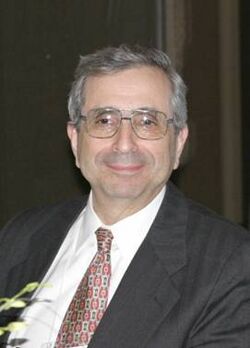
| Version | Summary | Created by | Modification | Content Size | Created at | Operation |
|---|---|---|---|---|---|---|
| 1 | Amina Yu | -- | 585 | 2022-11-14 01:21:59 |
Video Upload Options
1. Introduction
Jack H. Freed (born April 19, 1938) is an American chemist known for his pioneering work in electron paramagnetic resonance (aka electron spin resonance) spectroscopy. He is the Frank and Robert Laughlin Professor of Physical Chemistry, Emeritus, at Cornell University in Ithaca, New York.
2. Biography
Jack Freed was born in New York City. He received his bachelor's degree in chemical engineering in 1958 from Yale University and his Ph.D. in chemistry in 1962 from Columbia University.
Freed is currently the Frank and Robert Laughlin Professor of Physical Chemistry, Emeritus, in the Department of Chemistry and Chemical Biology at Cornell University[1]. In 2001, Freed founded the National Biomedical Center for Advanced Electron Spin Resonance Technology (ACERT)[2] funded by National Institutes of Health and has been its Director since then. In 2004, he was an editor for Journal of Physical Chemistry. Before that he was a fellow in numerous places such as Alfred P. Sloan Research Foundation, American Academy of Arts and Sciences, American Physical Society, John Simon Guggenheim Memorial Foundation, Hebrew University Institute for Advanced Studies, and Weizmann Institute of Science.
3. Honors and Awards
- Fellow of the A. P. Sloan Foundation, 1966
- Senior Fellow of the Weizmann Institute of Science, 1970
- Fellow of the American Physical Society, 1976
- Buck-Whitney Award in Pure and Applied Chemistry by American Chemical Society, 1981[3]
- Bruker Award in Electron Spin Resonance by the Royal Society of Chemistry, 1990
- Fellow of the American Academy of Arts and Sciences, 1994
- Gold Medal by International EPR/ESR Society, 1994[4]
- Irving Langmuir Prize in Chemical Physics by the American Physical Society, 1997[5][6]
- International Zavoisky Award by the Russian Academy of Sciences, 1998[7]
- Honorary member of the National Magnetic Society of India, 2001
- Special J.H. Freed Festschrift Issue by the Journal of Physical Chemistry on his 65th birthday, 2004[8][9]
- Fellow of the International Society of Magnetic Resonance, 2008
- E. Bright Wilson Award in Spectroscopy by the American Chemical Society, 2008[10][11]
- Fellow of the Royal Society of Chemistry, 2009
- Fellow of the American Association for the Advancement of Science, 2009
- ISMAR Prize by the International Society of Magnetic Resonance, 2013[12]
- Joel Henry Hildebrand Award in the Chemistry of Liquids by the American Chemical Society, 2014[13][14][15][16]
- Fellow of the International EPR/ESR Society, 2017[17]
4. Publications
- Liang, Zhichun; Freed, Jack H. (July 1999). "An Assessment of the Applicability of Multifrequency ESR to Study the Complex Dynamics of Biomolecules". The Journal of Physical Chemistry B 103 (30): 6384–6396. doi:10.1021/jp9907746.
- Georgieva, E. R.; Ramlall, T. F.; Borbat, P. P.; Freed, J. H.; Eliezer, D. (30 June 2010). "The Lipid-binding Domain of Wild Type and Mutant α-Synuclein: COMPACTNESS AND INTERCONVERSION BETWEEN THE BROKEN AND EXTENDED HELIX FORMS". Journal of Biological Chemistry 285 (36): 28261–28274. doi:10.1074/jbc.M110.157214.
- Meirovitch, Eva; Shapiro, Yury E.; Polimeno, Antonino; Freed, Jack H. (May 2010). "Structural dynamics of bio-macromolecules by NMR: The slowly relaxing local structure approach". Progress in Nuclear Magnetic Resonance Spectroscopy 56 (4): 360–405. doi:10.1016/j.pnmrs.2010.03.002.
- Bhatnagar, Jaya; Borbat, Peter P.; Pollard, Abiola M.; Bilwes, Alexandrine M.; Freed, Jack H.; Crane, Brian R. (11 May 2010). "Structure of the Ternary Complex Formed by a Chemotaxis Receptor Signaling Domain, the CheA Histidine Kinase, and the Coupling Protein CheW As Determined by Pulsed Dipolar ESR Spectroscopy". Biochemistry 49 (18): 3824–3841. doi:10.1021/bi100055m. PMID 20355710.
- Shin, C. S.; Dunnam, C. R.; Borbat, P. P.; Dzikovski, B.; Barth, E. D.; Halpern, H. J.; Freed, J. H. (1 August 2011). "ESR Microscopy for Biological and Biomedical Applications". Nanoscience and Nanotechnology Letters 3 (4): 561–567. doi:10.1166/nnl.2011.1206.
References
- "Jack Freed | Chemistry & Chemical Biology Cornell Arts & Sciences" (in en). http://chemistry.cornell.edu/jack-freed.
- "ACERT: Personnel". https://acert.cornell.edu/index_files/acert_personnel.php.
- "Buck-Whitney Award". http://easternny.sites.acs.org/buckwhitneyaward.htm.
- "International EPR (ESR) Society - Awards" (in en). http://www.ieprs.org/awards.php.
- "Prize Recipient" (in en). https://www.aps.org/programs/honors/prizes/prizerecipient.cfm?last_nm=Freed&first_nm=Jack&year=1997.
- "Cornell chemist Jack Freed receives APS award | Cornell Chronicle". http://news.cornell.edu/stories/1997/03/cornell-chemist-jack-freed-receives-aps-award.
- "Award Holders". http://www.kfti.knc.ru/en/zavoisky/Award_Holders/.
- "Cornell's Freed honored by Journal of Physical Chemistry special issue | Cornell Chronicle". http://news.cornell.edu/stories/2004/08/freed-honored-journal-physical-chemistry-special-issue.
- "The Journal of Physical Chemistry B (ACS Publications)" (in en). http://pubs.acs.org/toc/jpcbfk/108/27.
- "E. Bright Wilson Award in Spectroscopy - American Chemical Society" (in en). https://www.acs.org/content/acs/en/funding-and-awards/awards/national/bytopic/e-bright-wilson-award-in-spectroscopy.html.
- "Chemist Jack Freed wins 2008 Wilson Award in Spectroscopy | Cornell Chronicle". http://news.cornell.edu/stories/2008/02/cornell-chemist-jack-freed-wins-e-bright-wilson-award.
- "Jack H. Freed | ISMAR". https://www.weizmann.ac.il/ISMAR/jack-h-freed.
- "The Physical Chemistry Division of the American Chemical Society". http://phys-acs.org/awards/2014_national.html.
- "Six chemistry faculty receive national awards | Cornell Chronicle". http://news.cornell.edu/stories/2013/11/six-chemistry-faculty-receive-national-awards?qt-what_s_hot=0.
- "Joel Henry Hildebrand Award in the Theoretical and Experimental Chemistry of Liquids - American Chemical Society" (in en). https://www.acs.org/content/acs/en/funding-and-awards/awards/national/bytopic/joel-henry-hildebrand-award-in-the-theoretical-and-experimental-chemistry-of-liquids.html.
- Kemsley, Jyllian. "Joel Henry Hildebrand Award In The Theoretical & Experimental Chemistry Of Liquids | Chemical & Engineering News". http://cen.acs.org/articles/92/i6/Joel-Henry-Hildebrand-Award-Theoretical.html?type=paidArticleContent.
- "International EPR (ESR) Society - Awards" (in en). http://www.ieprs.org/fellows.php.

Location: New York




